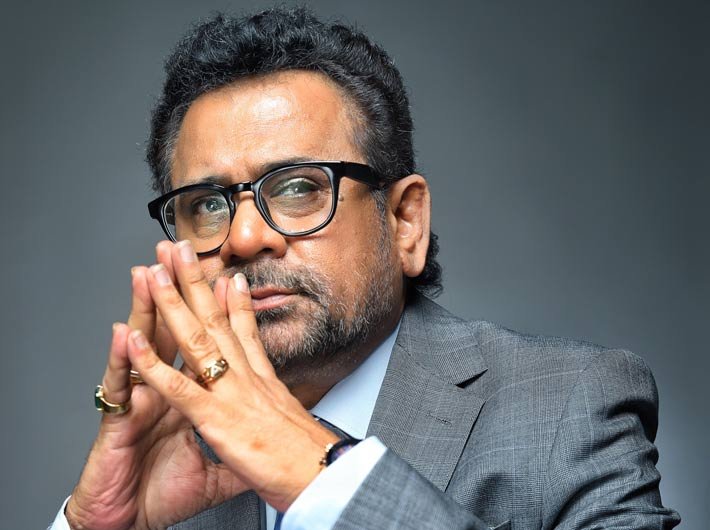Starting out as a child artist, in a career spanning more than three and half decades Anees Bazmee has written/directed more than 60 films in Hindi, Tamil and Marathi in a variety of genres. After writing films like ‘Hum Farishtey Nahin’, ‘Swarg’, and ‘Aankhen’, he directed commercially successful films like ‘Welcome’, ‘Ready’, ‘Singh is King’, ‘Welcome Back’, and ‘Pyar To Hona Hi Tha’ among others. His multi-starrer comedy, ‘No Entry’ became the biggest hit of 2005 earning more than Rs 430 million in domestic box office. His next film is highly anticipated ‘Pagalpanti’ (2019).
The book you are reading:
A very interesting book called ‘The Silent Patient’ by Alex Michaelides.
What do you enjoy more: writing or directing films?
Well, that's a tricky question. I have written more than 50 films and directed about 15 and I certainly enjoy both. Writing comes to me from my father and the love for writing will never fade away. But definitely direction is where my heart is, I feel at peace when I am behind the camera on my set.
How has the film industry changed over the years?
Everyone has to change with time and it is not just limited to the film industry but also every individual – in order to be relevant and updated. The film Industry has definitely changed and it has changed for good. I feel the actors are more professional and punctual now; they want to know things beyond the script to prepare for their characters. The filming process and the types of equipment have changed, with better and latest technologies coming in. The whole filmmaking process has become easier and more convenient but everything comes with a price, it has become far more expensive for sure.
How is digital and web space impacting the industry?
The impact of digital and web space has been positive so far. In fact, it is an opportunity for all the filmmakers to make content that has no boundaries; it is definitely a creative satisfaction.
Is it necessary to take formal training in the art and craft of cinema?
Talking about myself, I did not have formal training in filmmaking. Everything l have learned, everything, is on my job. I started my career as a child artist, later had the opportunity to assist some really great directors like Raj Sahab. During that time we did not have film schools and institutes, but now we are in 2019 and we have film schools/institutes. Formal training for sure comes handy along with passion and hard work.
Your greatest inspiration and influence?
I think a child's first influence is in the family and mine is no different. My influence and inspiration is definitely my ‘Waalid Sahab’, that is, my father [Abdul Hameed 'Nerang' Bazmee]. I have not seen a more passionate person than him. He has had a major influence on me and I am grateful to him for all the learnings.
Your most memorable moments?
When around 50 people attended the screening of the first trailer of ‘Pyaar Toh Hona Hi Tha’. Everyone thought it would be a big flop. After final editing and some retouching when the film released a few months later, the same guests loved it. These are the two memorable moments which were extreme reactions received for the same film.
What are the challenges you have faced in your career?
Embarking on a career in the industry is definitely a major challenge but the only way to achieve your goal is to work hard. There are no short cuts. People keep asking me that after 35 years in the industry how can I continue to make films that families can relate to and how can I pull that off? Well, staying relevant has never been a problem for me. I am always surrounded by young people, from my children to my actors to my crew. I think my communication with them helps me in stay relevant.
What is the impact of stereotyping on art and cinema?
It creates limitations. The cinematic world should not be limited by boundaries, stereotypes, languages or any other barriers.
What are the governance issues that matter to you the most?
Basic education and employment are two issues that matter to me the most. Both require dedicated involvement of the people in power at different levels so that we not only have an educated India but also globally recognized, successful India.
How does the social and political environment in our country impact your creative expression?
We as filmmakers create a world that allows a common man to escape his worries for a couple of hours. Having said that, much of these fictional stories are inspired from factual lives we live. We only create a different outlook on it. Hence, everything in real life affects reel life. We merely mould it in different shapes and different perceptions.
What would be you message to aspiring directors?
Filmmakers are storytellers and they must ensure that the story they want to tell is strong, unique and worthy of telling. As a storyteller, you should not only know the story but also be completely convinced to tell that story in a manner it is to be told. Moreover, there is no substitute to passion and hard work.
Tell us about your future plans.
My film ‘Pagalpanti’ is releasing on November 22 after which, from January 2020 onwards, I am shooting for ‘Bhool Bhulaiya 2’ which will release in July 2020.Thereafter, I will start shooting a film for Balaji Telefims (Ekta Kapoor) for which I am scripting at present.

